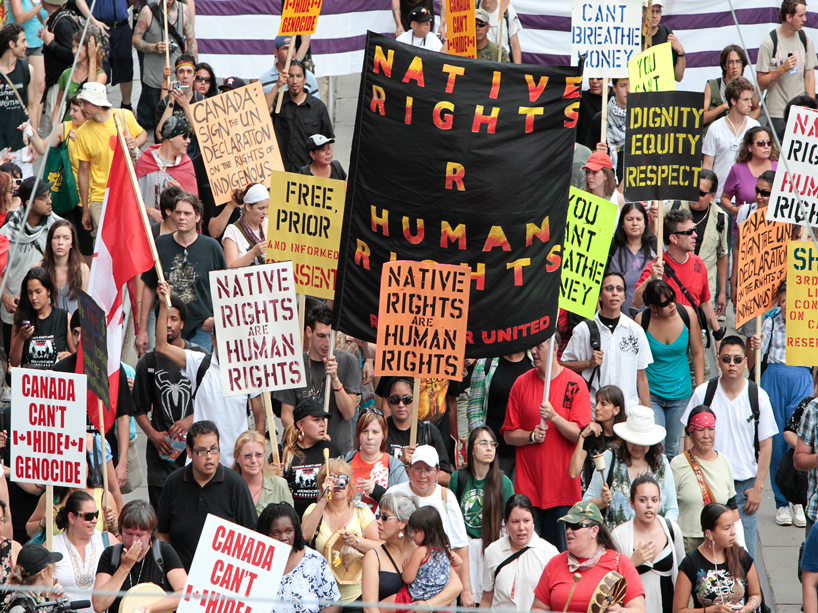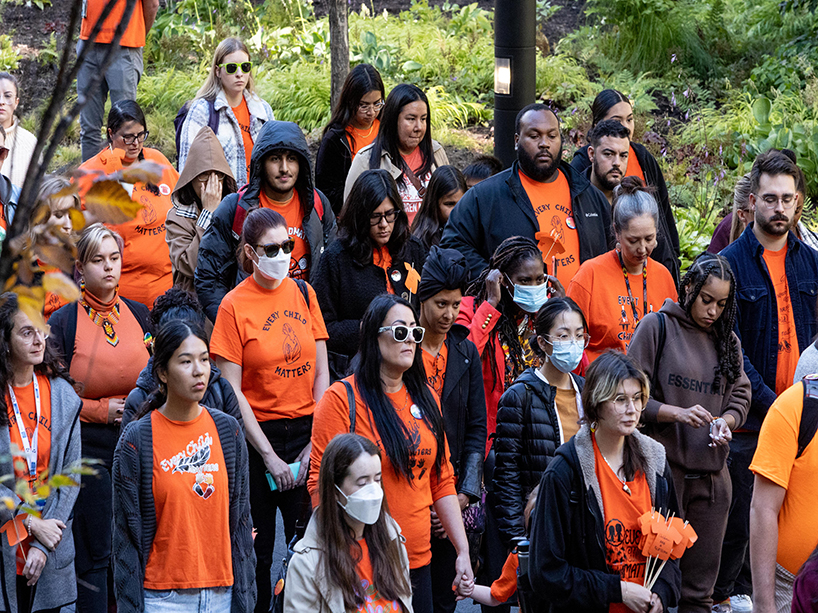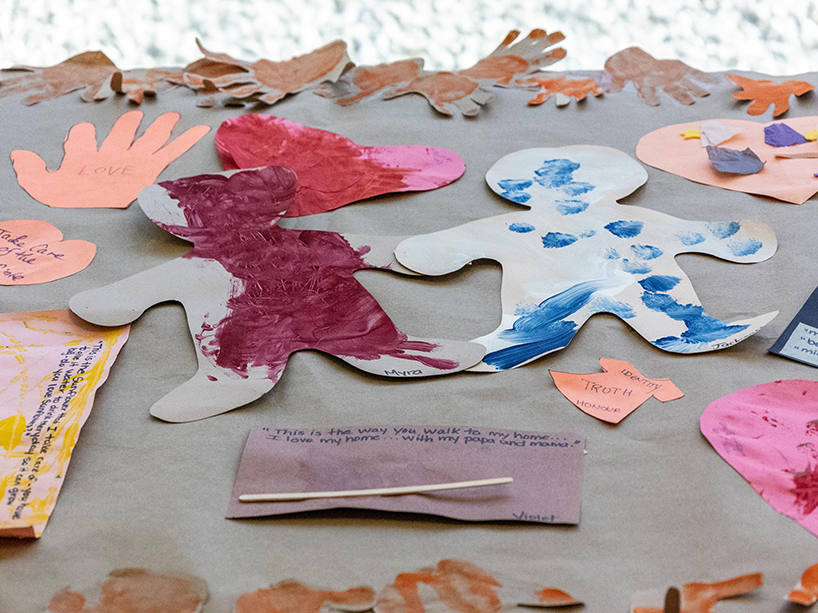Why TRC Calls to Action remain urgent and what you can do

In advance of the National Day for Truth and Reconciliation, the Yellowhead Institute hosted an important panel discussion on the progress made on actionable policy recommendations set out by the Truth and Reconciliation Commission.
The National Day for Truth and Reconciliation honours the children who never returned home from residential schools, the survivors of residential schools and their families and communities.
Acknowledgement of this painful history and the ongoing impacts of the residential school system is vital to the work of reconciliation, as is the ongoing need to implement the (PDF file) Calls to Action set out by the Truth and Reconciliation Commission (external link) to address the harmful legacy of the residential school system.
To mark this year’s day of reflection and dialogue, The Yellowhead Institute hosted a conversation on the importance of the 'Legacy' Calls to Action, the injustice of their incompletion, and the barriers to their completion.
The event was an evolution of the annual release of the Yellowhead Institute's accountability report, “Calls to Action Accountability: A 2021 Status Update on Reconciliation (external link) ”, published by Yellowhead Institute Research Director Eva Jewell and TMU history professor Ian Mosby. The event was also a precursor to the forthcoming 2022 Report which will feature the collaborators and conversations initiated at the event.
Mosby, co-host of the event and an award-winning historian of food, Indigenous health and the politics of Canadian settler colonialism, points out that Canada has only completed 11 of 94 Calls to Action in six years, something he sees as telling of the current state of reconciliation in Canada.
Legacy Calls to Action
The legacy Calls to Action are those that seek to address the ongoing structural inequalities that marginalize Indigenous peoples, intentionally or not.
I see [systemic racism] when government officials say ‘it's complex’ getting clean water to First Nations, even though they're doing that for the space station, population six.
#1-5 Child Welfare
“When the headlines die, so do the children,” is the message emphasized by Cindy Blackstock, Canadian Gitxsan activist for child welfare and executive director of the First Nations Child and Family Caring Society of Canada.
Blackstock was invited to speak to the changes needed to protect the rights of Indigenous children. She points out that the federal government continues to underfund public services, in particular child welfare services on reserves, despite a Canadian Human Rights Commission decision in 2016 in support of increased services. There have been 21 non-compliance and procedural orders since then.
She calls on the government to end Canada’s discrimination towards First Nations children, reminding us that there are more First Nations, Métis and Inuit kids in child welfare care today than at the height of residential schools.
What you can do:
Blackstock says that the First Nations Child and Family Caring Society of Canada (NCS) has a plan to remedy the inequalities that continue to exist called the Spirit Bear Plan (external link) . She reminds us that these urgent issues require resolution within a timeframe that “respects that children only have one childhood”.
The Caring Society encourages us to write to the Government of Canada and call them to action by fully implementing the Spirit Bear Plan and responding to all 94 Calls to Action. Here are example letter templates in both English and French:
For Orange Shirt Day, write to the Government of Canada and call them to action! Ask them to fully implement the Spirit Bear Plan and respond to all 94 Calls to Action!
— F. N. Caring Society (@CaringSociety) September 28, 2022
Here are example letter templates in both English and French to help you get started! pic.twitter.com/jc9eESr5sg
#6-12 Education
The six calls to action around education are largely focused on the federal government’s response to various concerns as well as accountability. “There's a huge discrepancy that exists between First Nations children being educated on reserves to those being educated off reserves,” says Sheila Cote-Meek, vice-president, equity, people & culture at York University.
Cote-Meek points out that recommendations around education remain urgent and focus on the creation of new Indigenous education legislation that ensures adequate funding, addresses educational achievement gaps, and ensures curriculum is culturally appropriate, relevant and meaningful. They also call for the protection of Indigenous languages including the teaching of Indigenous languages within the school systems. She says annual reports on the comparative funding and discrepancies that currently exist remain outstanding.
What you can do:
There is a wider need to acknowledge and recognize that systemic inequalities and racism exist in Canada, which begins with understanding colonialism and Indigenous history. One way to become more educated is through Indigenous Canada (external link) ,a free program offered through the Faculty of Native Studies at the University of Alberta that explores the different histories and contemporary perspectives of Indigenous Peoples in Canada.

The National Day for Truth and Reconciliation is meant to aid the healing process in two ways: acknowledging the full and painful history of the residential schools system, and creating systems to prevent these abuses from ever happening again in the future. Image of Orange Shirt Day 2022 at TMU. Photo by Carrie Davis
#18-24 Health
Dr. Janet Smylie is a respected international leader in the field of Indigenous health. She points out that while some of the Calls to Action are in progress, none have actually been completed. What is needed, Smylie says, is a real commitment, honesty and transparency by government leaders.
Health inequities are systemic and have colonial roots, says Smylie. In Canada, health funding is based on population size, with health services addressing the health needs of the community. When it comes to planning for health care for Indigenous, Inuit and Métis people, “we just don't have a population-based plan,” she says. Rather health care is based on fiscal constraints versus true population counts, needs and health priorities.
As an example, Smylie shares the long-time advocacy for increased access to routine services for Indigenous people, like Indigenous midwives. “Indigenous midwifery is actually one of the strongest evidence-based practices that could actually address the fact that infant mortality rates are still 2 to 4 times higher for First Nations and Inuit people in Canada than compared to the general population.”
This striking statistic doesn't get any better in cities, she says. There is a need for Indigenous birth centres that reflect Indigenous population needs. Additionally, Smylie says the federal government must stop hiding current infant mortality rates for Indigenous children.
At a fundamental level, Smylie says there needs to be acknowledgement of systemic racism in health care policy when it comes to First Nations, Inuit and Métis people, and a more comprehensive plan to address the inequalities that exist today.
What you can do:
Learn more about the Toronto Birth Centre (external link) .
By recognizing, respecting, supporting and implementing First Nations, Inuit and Métis community-based generative solutions, Smylie says we honour Indigenous beliefs about the interconnectedness of people and things.
#71-76 Missing Children
The existence of unmarked graves, says Kisha Supernant, shows the lack of value placed on Indigenous childrens’ lives.
The director of the Institute of Prairie and Indigenous Archaeology and anthropology professor at the University of Alberta says the poor record-keeping system and the lack of communication with families who were never notified of their children’s deaths or burials has led to an urgent need for the “identification, documentation, maintenance, commemoration and protection of residential school cemeteries."
On June 8, 2022, Kimberly Murray was appointed by the federal government as Independent Special Interlocutor for Missing Children and Unmarked Graves and Burial Sites associated with Indian Residential Schools. The Special Interlocutor will recommend a new federal framework to ensure the respectful and culturally appropriate treatment of unmarked graves and burial sites of children associated with former residential schools, work necessary to advance reconciliation.
“I'm hopeful that with the appointment of the special interlocutor that there will be a better framework for Nations to locate, protect and investigate the places where their children were buried, and then be able to do the necessary cemetery ceremonies in order to properly lay them to rest in our ways,” says Supernant.
It is critical that long-term support be given at the federal level, along with access to records. She says settlers can advocate and amplify these calls.
Since the Calls to Action were released progress has been incremental and with thousands of missing children, this work may take several more years. Supernant’s hope is that there will be continued pressure, advocacy and political support to help communities do this very difficult, and very sacred work.
She also highlights the need to support survivors of residential schools and not lose sight of the need for justice and accountability for the atrocities of this system.
What you can do:
Donate to the National Student Memorial Register (external link) .
Donate to the Institute of Prairie and Indigenous Archaeology (external link) (IPIA). Led by Supernant, the organization uses remote sensing technologies to locate and protect unmarked burials at the request of First Nations communities in Alberta and Saskatchewan.
Amplify work of Indian Residential School Survivors Society (external link) .

There remains an extensive amount of work to be done to account for all the children that never returned home and to locate their burial sites. On Orange Shirt Day we recognize that every child matters and mourn the children who lost their lives in residential schools. Image from commemorative project during Orange Shirt Day at TMU 2022. Photo by Carrie Davis
The way forward
Remedying inequalities in access to public services and chronic underfunding of basic services in Indigenous communities will go a long way towards completing the Calls to Action, says Cindy Blackstock.
“The evidence shows that inequality not only fuels bad outcomes in child welfare but also juvenile justice, mental health, educational outcomes and more. We know that inequalities are a barrier to community-based solutions that uplift the community and help address the trauma of residential schools,” she says.
By addressing inequities, Blackstock says First Nation, Inuit and Métis communities can focus on celebrating the richness of their cultures.
Monitor the progress on the Calls to Action at Indigenous Watchdog (external link) .
Read Yellowhead Institute’s, Calls to Action Accountability: A 2021 Status Update on Reconciliation (external link) by Eva Jewell and Ian Mosby.
Stay tuned for the forthcoming 2022 Calls to Action Accountability Report by Yellowhead Institute, to be released in December, which will expand on these calls and more and the impacts of their completion and incompletion.
The Indian Residential Schools Crisis Line (1-866-925-4419) is available 24 hours a day for anyone experiencing pain or distress as a result of their residential school experience.





